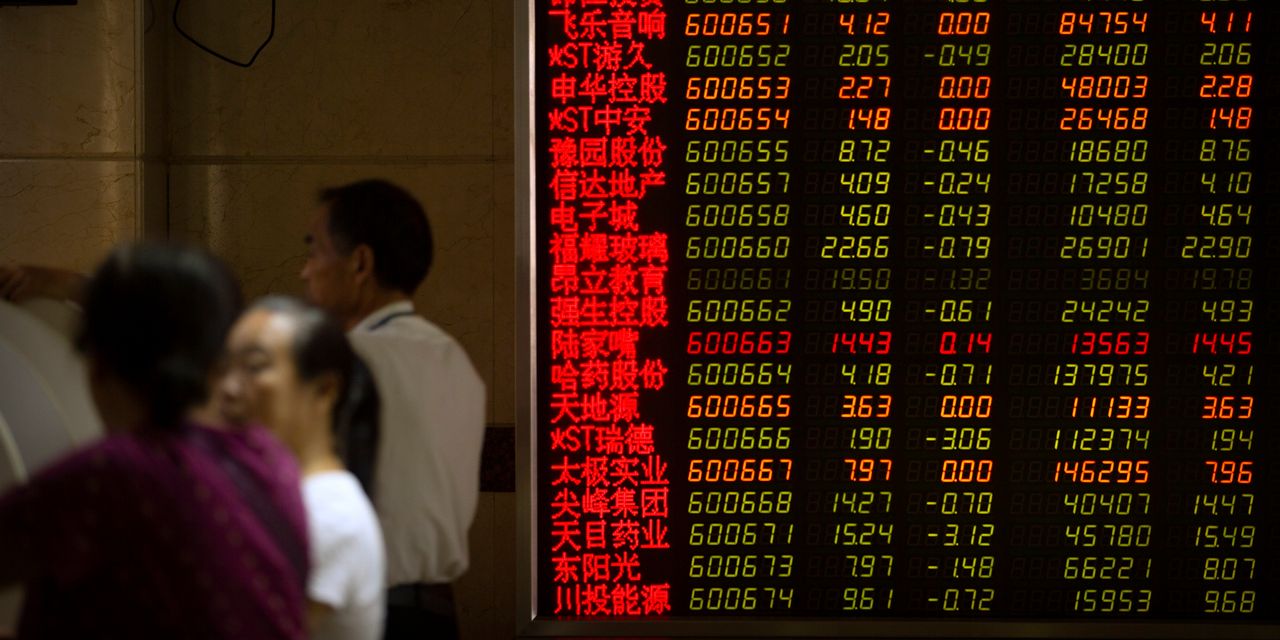
One of China’s largest managers of quant funds is languishing after a rare bout of underperformance in recent months, which led to an unusual public apology from the company this week.
High-Flyer Quant, a six-year-old firm started by a trio of young computer scientists who were university classmates, uses artificial-intelligence technology to pick domestic yuan-denominated stocks, design trading algorithms and hedge investment risks. It recently had the equivalent of $9.4 billion in assets under management, according to its website. The firm grew rapidly by producing returns that in some cases were 20 to 50 percentage points more than stock-market benchmarks in the past few years, according to a pitch it sent to clients.
The money manager, which invests based on proprietary trading algorithms, has more than 450 products under two registered private investment firms, according to data provider Wind. In China, such private fund management companies are akin to hedge funds and sell products only to qualified investors such as high-net-worth individuals and institutions.
Over the past four months, more than 100 of High-Flyer’s products declined by more than 10% from their recent peaks to troughs, according to Wind.
High-Flyer on Tuesday evening apologized via its WeChat account for its recent performance, saying that so-called maximum drawdown has reached a record high recently.
It said some of its products have underperformed benchmark indexes. The company blamed that partly on the firm’s artificial-intelligence system, which it said had failed to time trades well in “the middle of dramatic changes in investment risk and sector preferences.”
High-Flyer didn’t detail what those changes were. However, turns in risk tolerance and sector preferences are usually caused by changing policy priorities, economic cycles or inflation concerns. In China, the concept of “common prosperity”—which was emphasized by the Communist Party in the second half of this year—has triggered gains in stocks in industries such as manufacturing and agriculture, while sectors like real estate have suffered from less-favorable policies.
The firm added that it has examined the AI system and still believes that the stocks the system has chosen will deliver long-term value.
The AI system has been central to High-Flyer Quant’s approach since its founding in 2015. The company prides itself on having invested nearly 200 million yuan, equivalent to $31.4 million, in AI research and development so far, according to its marketing material.
However, its AI model tends to take on higher risks to achieve high returns when investment risk and sector preferences are changing. That tendency has increased the drawdown rate recently, the company said this week.
Some of High-Flyer’s products are benchmarked off the CSI 500 Index, which is made up of 500 small-cap stocks listed on China’s domestic stock market. Most of those products achieved cumulative returns of more than 100% since their establishment. Their losses for the past month ranged from 3% to 9%, Wind data shows, versus a 0.8% move in the CSI 500 index during the same period.
High-Flyer Quant also blamed its inconsistent performance on the rapid expansion of the domestic quant-fund industry, which has made the investment strategies of funds managed by different firms look increasingly similar.
High-Flyer didn’t reply to emails for comment. Calls to the company weren’t answered.
China’s quant-fund industry has boomed in recent years. According to Wind data, there are currently more than 2,000 quant-fund managers registered domestically, although most of them manage fewer than five products. High-Flyer Quant Investment Management (Ningbo), one of the firm’s two units, is the biggest manager in terms of the number of products, with 399, Wind data shows.
Despite its recent performance swings, most of High-Flyer’s clients have attained positive returns so far this year, according to the firm’s recent statement. However, the relative returns to the indexes have “failed the test,” it said.
The quant-fund manager has taken measures to control investor withdrawal and subscription since November. It said on Nov. 15 that it would stop taking in new money starting Dec. 2. On Nov. 25, High-Flyer added that clients wouldn’t need to pay redemption fees for all its yuan-denominated strategies should they choose to redeem their investments.
An investment adviser who is familiar with the performance of Chinese quant funds said the industry has had a rough few months, following many unexpected changes and market events.
The adviser added that because quantitative funds invest based on algorithms that are developed using historical patterns, they aren’t as quick to shift investment strategies as traditional active funds—making them more vulnerable to major and frequent shifts in the markets.
Write to Rebecca Feng at [email protected]
Copyright ©2021 Dow Jones & Company, Inc. All Rights Reserved. 87990cbe856818d5eddac44c7b1cdeb8








